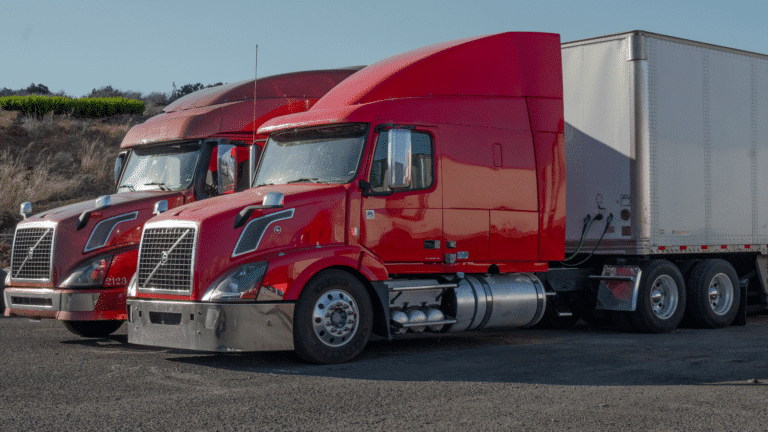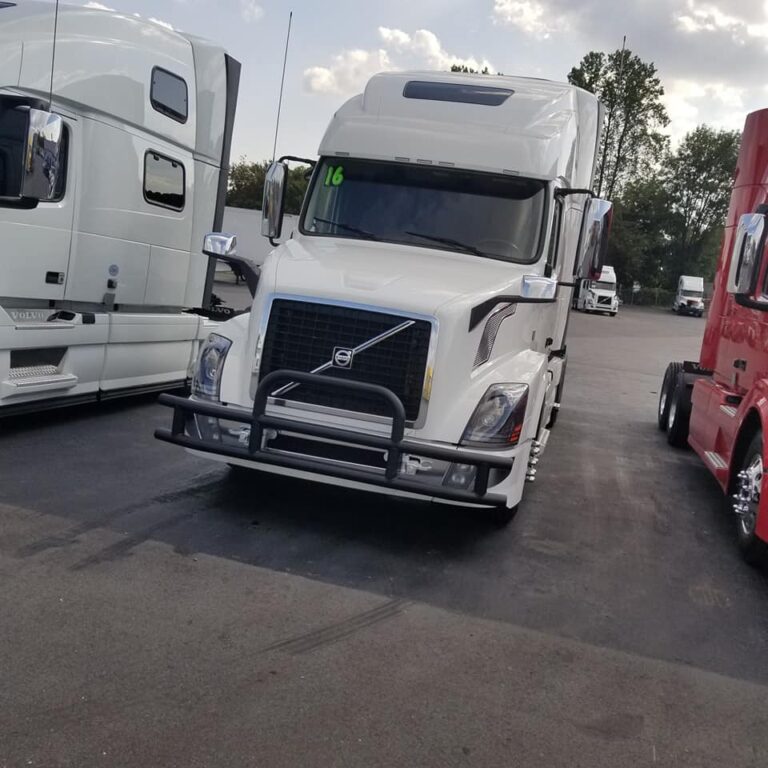The world of trucking has come a long way since the days of paper maps and CB radios. Technology has revolutionized how fleets operate, and GPS tracking is at the forefront of this transformation.
4G vehicle tracking systems are reshaping fleet management by offering real-time location data, improved communication, enhanced safety features, and better compliance tools. For carriers and fleet managers, these systems are becoming essential. They’re not just about knowing where trucks are; they’re about optimizing operations, ensuring driver safety, and staying competitive in a challenging industry.
The evolution of tracking technology has been rapid. Starting with basic GPS fleet tracking, it progressed through adding cellular connectivity and improved data speeds. Now, 4G represents the latest leap forward. It’s faster, more reliable, and packed with features that can transform how fleets operate.
As we dive deeper, you’ll see why 4G vehicle tracking is becoming a must-have for modern trucking operations. Whether you’re an owner-operator or managing a large fleet, understanding this technology is crucial for staying ahead in the industry.
Do you have any questions? Talk to ELD Advisor: 650-405-3372 or Request Callback
How 4G GPS Vehicle Trackers Work
To grasp the power of 4G tracking, let’s break down what 4G technology actually is. 4G stands for “Fourth Generation” of cellular network technology. It’s the successor to 3G and offers faster data speeds, lower latency, and improved reliability. For truckers, this means quicker, more dependable communication and data transfer.
4G tracking systems use a combination of GPS and cellular technology. GPS satellites pinpoint the vehicle’s location, the 4G vehicle tracker device collects this data, and it’s transmitted via 4G networks to a central server. Fleet managers can then access this information through web portals or mobile apps. The process happens in near real-time, giving you up-to-the-minute information about your fleet.
Why is 4G a big deal for vehicle tracking? Let’s compare:
- Speed. 4G is up to 10 times faster than 3G.
- Coverage. Better in rural areas where truckers often travel.
- Capacity. Can handle more data, enabling advanced features.
- Future-proof. While 3G networks have been phased out, 4G ensures continued service.
For truckers, these advantages translate to more accurate location tracking, faster updates on vehicle status, the ability to transmit more data, and reliable service across wider areas. It’s a significant leap that enables a whole new level of fleet management capabilities. From improved safety to better compliance tools, 4G GPS tracking is setting new standards in the industry.

Key Features of 4G Vehicle Tracking Systems
GPS tracking systems come packed with features that can revolutionize your fleet management. Real-time location tracking with improved accuracy allows you to know exactly where your trucks are, anytime. You can get location data as often as every 30 seconds and visualize your fleet’s movement on detailed maps. This level of accuracy helps you make informed decisions quickly, respond to customer inquiries with confidence, and manage your resources more effectively.
The faster data transmission and updates enabled by 4G aren’t just about location data. They allow for quick transmission of vehicle diagnostics, rapid communication of route changes, and swift alerts for any issues or emergencies. With 4G, you’re always in the loop, reducing delays and improving overall fleet efficiency.
The tracking devices are designed for optimal power use, offering longer battery life in standby mode, efficient power management during active tracking, and less strain on the vehicle’s electrical system. You get reliable tracking without worrying about dead batteries or drained vehicle power.
Moreover, 4G vehicle GPS trackers integrate well with other fleet management tools. They can seamlessly connect with electronic logging devices (ELDs), integrate with dashcams for video recording, and are compatible with maintenance scheduling software. This integration creates a comprehensive fleet management ecosystem, giving you a 360-degree view of your operations.
Benefits of 4G Tracking for Truckers
Now that we’ve covered the features, let’s dive into how 4G vehicle tracking directly benefits truckers and fleet managers:
- Improved route optimization and fuel efficiency. Real-time traffic updates enable dynamic route adjustments, saving time and fuel. Optimized routes lead to fewer miles driven, reduced fuel costs, and more deliveries completed in less time.
- Enhanced safety and security for drivers and cargo. Real-time accurate location data for quick emergency response, bolster safety. Constant monitoring deters theft. These features protect assets while contributing to lower insurance premiums and better driver retention.
- Better compliance with hours of service (HOS) regulations. Automatic logging of driving hours, timely alerts for approaching HOS limits, and easy compliance report generation simplify regulatory adherence. This streamlined process significantly reduces the risk of violations and associated fines.
- Reduced paperwork and administrative tasks. Automated record-keeping, digital storage of delivery confirmations, and easy access to historical data minimize paperwork. This shift allows drivers to focus more on driving and delivering, boosting overall productivity.
- Improved communication between drivers and dispatchers. Real-time visibility empowers dispatchers to make informed decisions, while detailed instruction sharing enhances clarity. This improved communication leads to smoother operations, fewer misunderstandings, and increased satisfaction for both drivers and customers.
4G vehicle tracking isn’t just about keeping tabs on your trucks. It’s a comprehensive tool that can transform your entire operation, offering improvements in both efficiency and safety.
Choosing the Right 4G Vehicle Tracking System
Selecting the best 4G vehicle tracking system for your fleet is crucial. For instance, a small fleet might prioritize simplicity, while larger operations may need more advanced features. Here are some factors to consider:
- Fleet size and scalability. Choose a system that can accommodate your current fleet and grow with your business, ensuring long-term viability.
- Coverage area and reliability. Verify the system works consistently in all regions where your trucks operate, including rural or remote areas.
- Integration and compatibility. Look for solutions that seamlessly integrate with your existing software ecosystem, including ELDs, maintenance systems, and accounting software.
- User interface and ease of use. Select a system with an intuitive interface that your team can quickly learn and efficiently operate on a daily basis.
- Total cost of ownership. Factor in both upfront costs and ongoing expenses, such as subscription fees, hardware upgrades, and potential customization costs.
- Customer support and training. Ensure the provider offers reliable, accessible support and comprehensive training to maximize your system’s effectiveness.
- Key features. Compare essential functionalities like real-time tracking intervals, geofencing capabilities, driver behavior monitoring, fuel consumption tracking, and mobile app availability.
- Research and demos. Thoroughly investigate options by reading user reviews, requesting product demonstrations, and possibly trialing systems before making a final decision.
- Customization and flexibility. Look for providers that offer flexible contract terms, especially beneficial for smaller fleets.
- Installation and implementation. Opt for solutions with straightforward setup processes that minimize fleet downtime during transition.
- Data security and compliance. Ensure the system employs robust data protection measures and complies with relevant industry regulations and standards.
Remember, the cheapest option isn’t always the best value. Look for a system that offers the right balance of features, reliability, and cost for your specific needs.
HOS247 4G Tracking System’s Benefits

HOS247 offers a comprehensive 4G tracking solution designed for the modern trucking industry. This system provides a balance of functionality and ease of use, catering to fleets of various sizes. Here are some of the benefits we offer:
- User-friendly interface. Enjoy an easy-to-learn and navigate interface, minimizing the learning curve and ensuring quick adoption by your team.
- No long-term contracts. Benefit from flexibility with no long-term contracts, allowing you to adjust the service as your fleet’s needs change.
- Multilingual support. Our top-rated technical support team is available every day of the week in English, Spanish, Russian, and Polish, ensuring effective communication and support for a diverse range of drivers and fleet managers.
- Regular updates. Stay compliant with the latest regulations and industry needs through regular system updates, keeping your fleet management tools current and effective.
- Reliable hardware options. Choose between hardwired or plug-and-play devices that offer dependable performance and durability, suitable for various fleet types and sizes.
- Integrated fleet management tools. HOS247 4G vehicle tracker is part of our fleet management suite, which includes:
- ELD. Seamlessly integrate with HOS247’s top-rated electronic logbook for compliance.
- IFTA mileage calculations. Simplify your fuel tax reporting with automated IFTA mileage calculations, reducing administrative burdens and ensuring accuracy in tax submissions.
- Fault code detection. Proactively address vehicle maintenance issues with fault code detection, which alerts you to potential problems before they become major repairs, reducing downtime and maintenance costs.
- Idling monitoring. Improve fuel efficiency and reduce emissions by monitoring idling times. This feature helps identify areas where drivers can cut unnecessary idling, saving fuel and promoting eco-friendly practices.
- Vehicle maintenance. Schedule and manage vehicle maintenance efficiently with reminders and alerts for upcoming service needs. This ensures your fleet remains in optimal condition, reducing the risk of breakdowns and extending vehicle lifespan.
When considering HOS247 or any other 4G vehicle tracking system, think about how it fits into your overall fleet management strategy. The right system should not only meet your current needs but also support your future growth and adapt to changing industry requirements.
GPS Tracking Implementation and Best Practices

Selecting the best 4G vehicle tracking system for your fleet is a crucial decision that can significantly impact your operations. It begins with choosing the right 4G vehicle tracking system for your business. Here are the key factors to take into account to make an informed decision:
- Fleet size and scalability. Ensure the system can grow with your business.
- Coverage area. Verify reliability in all regions where your trucks operate.
- Integration capabilities. Look for compatibility with your existing software.
- User interface. Choose a system that’s intuitive for your team.
While these factors form the foundation of your decision, don’t overlook the importance of cost and support. Consider both upfront and ongoing expenses to understand the total cost of ownership. Additionally, reliable customer support can be invaluable for smooth operations and maximizing the system’s benefits.
When comparing different options, pay close attention to the features each system offers. Key functionalities to evaluate include:
- Real-time tracking intervals.
- Geofencing capabilities.
- Driver behavior monitoring.
- Fuel consumption tracking.
- Mobile app availability.
Research is crucial in this process. Take the time to read user reviews, request product demonstrations, and if possible, trial systems before making your final decision. This hands-on approach can provide invaluable insights into how each system performs in real-world conditions.
As you evaluate systems, keep your specific fleet needs in mind. Start by listing your must-have features and consider your future growth plans. Look for systems that can adapt to your changing needs. Also, check for easy installation processes that minimize downtime during implementation.
Lastly, don’t forget about data security and compliance. Ensure the system you choose has strong data protection measures in place and complies with relevant industry regulations. This not only protects your business but also gives you peace of mind in an increasingly data-driven industry.
By carefully considering these factors, you’ll be well-equipped to choose a 4G vehicle tracking system that enhances your fleet’s efficiency, safety, and overall performance.
Addressing the Driver Shortage Crisis with 4G Vehicle Tracking

The trucking industry is grappling with a significant challenge: a severe shortage of qualified drivers. Trucking HR Canada estimates the industry needs to hire approximately 17,230 new truck drivers annually from 2021 until 2025 to meet the demand This shortage ripples through the industry, impacting delivery times, driving up costs, and intensifying pressure on existing drivers.
4G tracking technology offers a multi-faceted solution to this crisis, particularly in improving driver retention. By leveraging data to create fair schedules, companies can prevent overwork and burnout. The system allows for recognition of good performance, rewarding safe and efficient driving. It also streamlines administrative tasks, freeing up drivers to focus on the road. Real-time support helps drivers navigate challenges, while implemented safety measures demonstrate that their wellbeing is valued. These improvements create a supportive environment where drivers are more likely to stay with their company.
Furthermore, 4G tracking data can be harnessed to streamline operations and alleviate driver stress. By optimizing loading and unloading times, frustrating wait periods are reduced. Enhanced communication keeps drivers informed about changes or delays, while accurate ETAs relieve the pressure of meeting unrealistic deadlines. This reduction in stress not only leads to happier drivers but also potentially extends their careers in trucking.
The adoption of cutting-edge technology like 4G tracking also aids in attracting new drivers to the industry. A modern fleet appeals to tech-savvy younger drivers, while data-driven performance reviews offer clear paths for advancement. Using tracking data to ensure fair home time improves work-life balance, a crucial factor for many potential recruits. Ultimately, a reputation for embracing advanced technology can significantly boost a company’s appeal to the next generation of drivers, helping to address the industry’s long-term workforce challenges.
Conclusion

4G vehicle tracking represents far more than a mere technological upgrade; it’s a cornerstone of modern trucking operations. This advanced system offers a comprehensive solution, providing real-time fleet visibility, enhancing safety and compliance measures, boosting efficiency, generating cost savings, and significantly improving driver support and retention.
In an industry beset by challenges such as driver shortages and increasingly stringent regulations, 4G vehicle tracking emerges as a powerful ally. It empowers companies to maximize their existing resources, create better working conditions for drivers, and maintain a competitive edge in a demanding market landscape.
As you contemplate implementing or upgrading to a 4G GPS vehicle tracker, keep in mind the importance of choosing a solution tailored to your specific needs. Careful planning for implementation, thorough team training, and continuous data leverage for improvements are key to realizing the full potential of this technology.
The future of trucking is undeniably data-driven, with 4G tracking at its core. By embracing this technology, you’re not merely monitoring your fleet; you’re paving the way for a more efficient, safe, and sustainable trucking industry.
Don’t risk falling behind in this rapidly evolving sector. Take the initiative to explore GPS tracking options today and set your operation on the path to a more connected and efficient future. With the right system in place, you’ll be well-equipped to navigate current challenges and capitalize on emerging opportunities.

As an expert in B2B and B2C sales, I’ve dedicated myself to perfecting sales processes and client retention strategies in the logistics and trucking industry. I have significantly contributed to the expansion of the ELD service, catering to retail and wholesale clients in need of HOS247 ELD solutions. My unwavering commitment to implementing state-of-the-art sales techniques and technologies ensures the continuous growth and success of businesses I work with.












The transition from traditional paper logs to electronic solutions marked a significant advancement in the transportation industry. Electronic logbooks, mandatory for most commercial drivers, streamline the process of recording hours of service (HOS) for greater accuracy and their power can

ELD logs are here to stay: using an electronic logging device will become mandatory for commercial vehicles in Canada as of January 1, 2023. Professionals in the industry must choose and equip one to comply with the law. This is

Electronic logging devices (ELDs) are now a standard requirement in the trucking industry, and their importance continues to grow in 2025. As truckers face stricter compliance demands and increasing operational challenges, having a reliable driving log app becomes essential. The